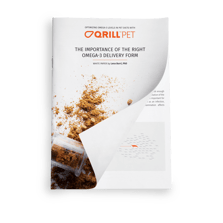The horse health market is on the move. In fact, research shows that horse owners spend over $600 million per year and that number is expected to rise. Furthermore, an estimated 49% of all horse owners use dietary supplements for their horses.
Did you know that omega-3 fatty acids are essential for horse health? Similar to dogs and cats, supplementing horse feed with omega-3s can help contribute to their overall health and well-being. And just like cats, dogs, and even humans, horses cannot make omega-3 fatty acids on their own which means that they have to get it from their diet.

The source matters
The right source of omega-3 matters, but not all omega-3s are created equal. A horse’s general diet consists of omega-3, mostly from vegan sources. When horses eat grass, they must convert ALA (alpha linolenic acid) to long-chain EPA (eicosapentaenoic acid) and DHA (docosahexaenoic acid) to obtain the health benefits, but this conversion process is not very efficient. In fact, several studies indicate that the conversion rate of ALA to EPA is low, and from ALA to DHA is often absent.
Phospholipid-bound EPA and DHA helps (such as those found in krill) incorporate the fatty acids effectively into the cells, helping to increase omega-3 levels in animals, including horses.
Marine omega-3 vs plant-based omega-3
The many benefits of krill
Antarctic krill is a unique ingredient that delivers omega-3s in phospholipid form and it naturally contains choline and the powerful antioxidant astaxanthin, supporting cell integrity and much more.
Generally, in various animal species, EPA and DHA fatty acids are said to have positive effects on skin and fur, the heart, joints, kidney function, immunity and inflammation. Several studies propose that omega-3s might have beneficial effects on inflammatory reactions in horses.
When it comes to horses in particular, krill can be beneficial for oxidative stress, upper tract infections, ulcers, joint health and mobility. Krill also helps prevent dry skin, keeping horses’ coats healthy and shiny.
Other health benefits of omega-3s for pets
Studies on the horizon
In addition to studies on dogs and cats, the science team at Aker BioMarine is actively studying the health benefits of krill in horses. We discovered how horses in general have extremely low omega-3 index compared to humans, and we wanted to investigate how to improve that to obtain health benefits.
A recent study in Uruguay shows promising initial results such as a substantial increase in the omega-3 index after krill oil supplementation over 8 weeks. More studies are coming.
“For years, the team at QRILL Pet (and Aker BioMarine) has worked on numerous studies for pet health and we are prioritizing horse health, similar to the way we look into dog or cat health,” says Tonje Dominguez, Director of QRILL Specialty Animal Nutrition Products. “Based on what we have seen, there are many benefits from krill for horses and we look forward to further exploration.”
Need an innovation for your pet food brand?

